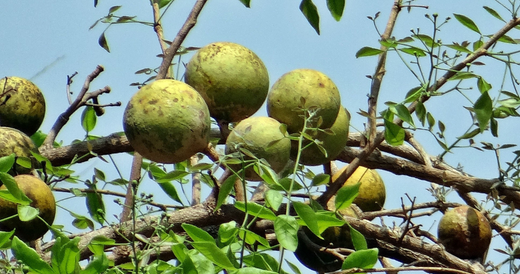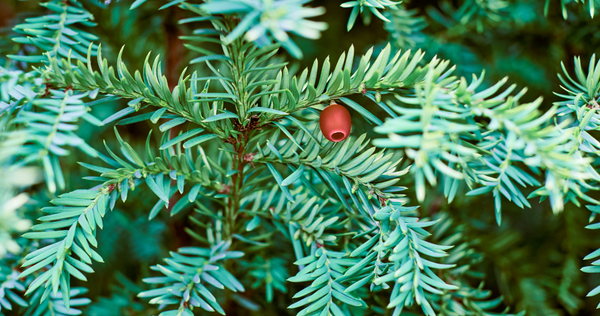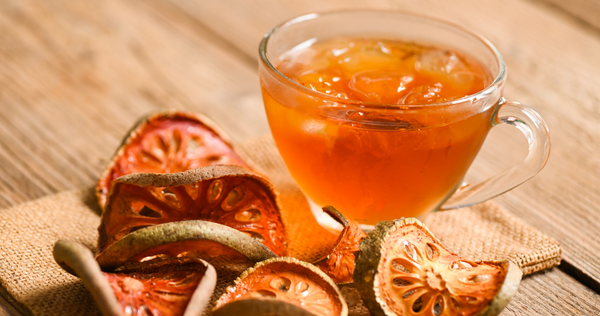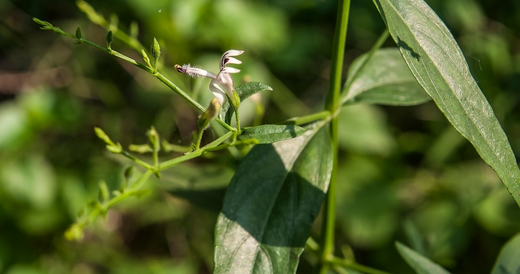
Bael or Bilva Guide: 10 Benefits, Uses & Side Effects
Hindi Name: Bel
Sanskrit Name: Bilva
English Name: Bengal Quince
Spanish Name: Membrillo de Bengala
French Name: Coing du Bengale
- Aegle marmelos, commonly known as bael, is an aromatic tree. The bael fruit has a hard, woody shell and is typically green or yellow when ripe.
- Native to India and widely distributed in Southeast Asia.
- Integral part of Ayurvedic medicine for centuries. Bael is valued for its medicinal properties and is used in various Ayurvedic formulations.
Evidence Based Benefits of Bael (Bilva)
1. Digestive Health
Bael is celebrated for its digestive properties, helping alleviate issues like constipation and diarrhea, attributed to its rich fiber content. Making it a right for curing digestive issues.
2. Antimicrobial Action
Research suggests that bael possesses antimicrobial properties, aiding in the prevention and management of infections.
3. Respiratory Health Support

Source: Canva
Bilva has traditional uses in respiratory conditions, and emerging research suggests its potential in managing disorders like asthma.
4. Cardioprotective Qualities
Bael may support heart health by regulating cholesterol levels and promoting overall cardiovascular well-being.
5. Immune System Enhancement
Bael fruit benefits arise from its vitamin C content and other antioxidants that contribute to immune system strengthening, potentially reducing susceptibility to illnesses. You can also explore wide range of Ayurvedic immunity products.
6. Diabetes Management
Studies indicate that bael may assist in managing diabetes by helping regulate blood sugar levels.
7. Anti-Inflammatory Benefits
The presence of compounds like tannins contributes to the fruit's anti-inflammatory properties, potentially beneficial for conditions involving inflammation.
8. Liver Health
Compounds in bael may have hepatoprotective effects, supporting liver health and function.
9. Antioxidant Defense
Bael's antioxidants, including flavonoids, help combat oxidative stress, protecting cells from damage.
10. Skin Care
The fruit's nutritional profile and antioxidants may contribute to improved skin health, potentially addressing issues like dermatitis and promoting a radiant complexion.
Bael for Digestive Health
Bael's high fiber content, including both soluble and insoluble fiber, promotes digestive health by regulating bowel movements and preventing constipation. The fibrous nature of the fruit, along with compounds like pectin, supports efficient digestion.
The soluble fiber aids in softening the stool, while insoluble fiber adds bulk, facilitating the smooth passage of food through the digestive tract. Pectin, a soluble fiber found in bael, contributes to the gel-like consistency that aids in soothing and regulating the gastrointestinal system.
Bael for Antimicrobial Action

Source: Canva
Bael exhibits antimicrobial effects attributed to compounds such as tannins and alkaloids. Tannins act by binding to proteins in the microorganisms, disrupting their structure and function. This antimicrobial action, alongside other compounds in bael, underscores its traditional use in folk medicine for combating infections and promoting overall health.
Bael for Respiratory Health Support
Bael has been traditionally used for respiratory health, and its potential in managing conditions like asthma may be attributed to compounds like β-caryophyllene. This natural constituent, found in the essential oil of bael, exhibits anti-inflammatory and bronchodilatory effects, contributing to improved respiratory function.
In addition to this, you can now buy Ayurvedic Bilva medicines online at the best price from our authorised website "zanducare.com"
Nutrition Facts of Bael
|
Nutrient |
Amount per 100g |
|
Mineral |
1.7 g |
|
Carbohydrates |
31.8 g |
|
Protein |
1.8 g |
|
Fat |
0.3 g |
|
Fiber |
2.9 g |
|
Calcium |
85 mg |
|
Phosphorus |
50 mg |
|
Potassium |
600 mg |
|
Vitamin C |
28.5 mg |
|
Energy |
137 kcal |
How Does Bael Work To Counter Oxidative Stress?
Bael fruit confers health benefits through its rich array of bioactive compounds. Tannins, flavonoids, and alkaloids in bael exhibit potent antioxidant and anti-inflammatory properties, mitigating oxidative stress and inflammation. The fruit's high fiber content aids digestion, preventing constipation, while compounds like pectin contribute to gastrointestinal health.
Bael's antimicrobial effects, attributed to tannins and alkaloids, may help combat infections. β-caryophyllene in the essential oil supports respiratory health by exhibiting anti-inflammatory and bronchodilatory effects. Additionally, the fruit's vitamins and minerals strengthen the immune function, while its hepatoprotective compounds contribute to liver health. These mechanisms collectively underscore bael's holistic impact on well-being.
Other Plants
Ways to Use Bael

Source: Canva
- Fresh Fruit Consumption: The ripe fruit can be eaten directly, offering a sweet and aromatic flavor.
- Bael Juice: Extracting juice from the pulp, often mixed with water or sweeteners for a refreshing drink.
- Dried Bael Powder: The dried fruit is powdered and used in culinary applications or mixed with water for a concentrated dose.
- Ayurvedic Formulations: Bael is a key ingredient in various Ayurvedic medicines, particularly those targeting digestive issues.
- Traditional Desserts: Bael is incorporated into traditional sweets and desserts for both flavor and health benefits.
- Infusions: Bilva leaves and extracts may be used in infusions, providing a different way to enjoy the medicinal properties.
Bael Facts and Myths
Facts About Bael
- Fact 1: Bael leaves benefits are well-known. Apart from that, Bael offers a range of other health advantages due to its rich nutrient profile.
- Fact 2: Bael is consumed in various forms like juice, dried powder, and Ayurvedic formulations, providing flexibility in usage.
- Fact 3: Bael has been a staple in Ayurveda for centuries, recognized for its diverse health-promoting properties beyond recent superfood trends.
Myths About Bael
- Myth 1: Bael is only for digestive issues. There aren't any bael medicinal uses.
- Myth 2: Bael can only be consumed fresh.
- Myth 3: Bael is a modern superfood discovery.
Growing Bael at Home
Plant a Bilva tree in a sunny spot with well-draining soil. Choose either seeds or saplings for planting, ensuring adequate spacing. Water consistently, and prune as needed to encourage healthy growth, bearing in mind that Bael trees can take several years to mature and produce fruit.
Where to Buy Bael Based Products in India?
For reliable Ashwagandha products, consider purchasing from reputable brands such as Zanducare. Zanducare prioritizes quality and transparency in sourcing, ensuring you receive a trustworthy and effective supplement.
Other Plants:
Conclusion
In a world often plagued by digestive issues and stress-related concerns, individuals seek holistic solutions for well-being. Bael products emerge as a natural remedy, offering relief from digestive discomfort and providing essential nutrients. Rich in tradition and recognized in Ayurveda, Bael addresses contemporary health challenges. By integrating Bael products into daily life, users not only find comfort in immediate issues but also embrace a time-tested approach for sustained vitality and overall wellness.
FAQs
1. What is Bael used for in Ayurveda?
Bael is utilized in Ayurveda for its digestive benefits and is known to alleviate issues like diarrhea and dysentery.
2. Can I eat Bael directly?
Yes, the ripe fruit of Bael can be consumed directly for its sweet and aromatic taste.
3. How is Bael beneficial for digestion?
Bael contains compounds that aid in digestive health, providing relief from common digestive issues.
4. Are there any side effects of consuming Bael?
Generally safe, but excessive consumption may lead to constipation.
5. Can pregnant women consume Bael?
Pregnant women should consult a healthcare professional before consuming Bael to ensure it aligns with their health needs.






Leave a comment
This site is protected by hCaptcha and the hCaptcha Privacy Policy and Terms of Service apply.